- Home
- Rick Yancey
The 5th Wave t5w-1 Page 3
The 5th Wave t5w-1 Read online
Page 3
“Do we have to talk about this?”
“What else is there to talk about?” His eyebrows climbed toward his hairline. Mitchell had very bushy eyebrows. It was one of the first things I noticed about him. He also chewed his fingernails. That was the second thing I noticed. Cuticle care can tell you a lot about a person.
I pulled out my phone and texted Lizbeth:
help me
“Are you scared?” he asked. Trying to get my attention. Or for some reassurance. He was looking at me very intently.
I shook my head. “Just bored.” A lie. Of course I was scared. I knew I was being mean, but I couldn’t help it. For some reason I can’t explain, I was mad at him. Maybe I was really mad at myself for saying yes to a date with a guy I wasn’t actually interested in. Or maybe I was mad at him for not being Ben Parish, which wasn’t his fault. But still.
help u do wat?
“I don’t care what we talk about,” he said. He was looking toward the rose bed, swirling the dregs of his coffee, his knee popping up and down so violently under the table that my cup jiggled.
mitchell. I didn’t think I needed to say any more.
“Who are you texting?”
told u not to go out w him
“Nobody you know,” I said. dont know why i did
“We can go somewhere else,” he said. “You want to go to a movie?”
“There’s a curfew,” I reminded him. No one was allowed on the streets after nine except military and emergency vehicles.
lol to make ben jealous
“Are you pissed or something?”
“No,” I said. “I told you what I was.”
He pursed his lips in frustration. He didn’t know what to say.
“I was just trying to figure out who they might be,” he said.
“You and everybody else on the planet,” I said. “Nobody actually knows, and they won’t tell us, so everybody sits around guessing and theorizing, and it’s all kind of pointless. Maybe they’re spacefaring micemen from Planet Cheese and they’ve come for our provolone.”
bp doesnt know i exist
“You know,” he said, “it’s kind of rude, texting while I’m trying to have a conversation with you.”
He was right. I slipped the phone into my pocket. What’s happening to me? I wondered. The old Cassie never would have done that. Already the Others were changing me into someone different, but I wanted to pretend nothing had changed, especially me.
“Did you hear?” he asked, going right back to the topic that I said bored me. “They’re building a landing site.”
I had heard. In Death Valley. That’s right: Death Valley.
“Personally, I don’t think it’s a very smart idea,” he said. “Rolling out the welcome mat.”
“Why not?”
“It’s been three days. Three days and they’ve refused all contact. If they’re friendly, why wouldn’t they say hello already?”
“Maybe they’re just shy.” Twisting my hair around my finger, tugging on it gently to produce that semipleasant pain.
“Like being the new kid,” he said, the new kid.
That can’t be easy, being the new kid. I felt like I should apologize for being rude. “I was kind of mean before,” I admitted. “I’m sorry.”
He gave me a confused look. He was talking about the aliens, not himself, and then I said something about me, which was about neither.
“It’s okay,” he said. “I heard you don’t date much.”
Ouch.
“What else did you hear?” One of those questions you don’t want to know the answer to, but still have to ask.
He sipped his latte through the little hole in the plastic lid.
“Not much. It’s not like I asked around.”
“You asked somebody and they told you I didn’t date much.”
“I just said I was thinking about asking you out and they go, Cassie’s pretty cool. And I said, what’s she like? And they said you were nice but don’t get my hopes up because you had this thing for Ben Parish—”
“They told you that? Who told you that?”
He shrugged. “I don’t remember her name.”
“Was it Lizbeth Morgan?” I’ll kill her.
“I don’t know her name,” he said.
“What did she look like?”
“Long brown hair. Glasses. I think her name is Carly or something.”
“I don’t know any…”
Oh God. Some Carly person I don’t even know knows about me and Ben Parish—or the lack of any me and Ben Parish. And if Carly-or-something knew about it, then everybody knew about it.
“Well, they’re wrong,” I sputtered. “I don’t have a thing for Ben Parish.”
“It doesn’t matter to me.”
“It matters to me.”
“Maybe this isn’t working out,” he said. “Everything I say, you either get bored or mad.”
“I’m not mad,” I said angrily.
“Okay, I’m wrong.”
No, he was right. And I was wrong for not telling him the Cassie he knew wasn’t the Cassie I used to be, the pre-Arrival Cassie who wouldn’t have been mean to a mosquito. I wasn’t ready to admit the truth: It wasn’t just the world that had changed with the coming of the Others. We changed. I changed. The moment the mothership appeared, I started down a path that would end in the back of a convenience store behind some empty beer coolers. That night with Mitchell was only the beginning of my evolution.
Mitchell was right about the Others not stopping by just to say howdy. On the eve of the 1st Wave, the world’s leading theoretical physicist, one of the smartest guys in the world (that’s what popped up on the screen under his talking head: ONE OF THE SMARTEST GUYS IN THE WORLD), appeared on CNN and said, “I’m not encouraged by the silence. I can think of no benign reason for it. I’m afraid we may expect something closer to Christopher Columbus’s arrival in the Americas than a scene from Close Encounters, and we all know how that turned out for the Native Americans.”
I turned to my father and said, “We should nuke ’em.” I had to raise my voice to be heard over the TV—Dad always jacked up the volume during the news so he could hear it over Mom’s TV in the kitchen. She liked to watch TLC while she cooked. I called it the War of the Remotes.
“Cassie!” He was so shocked, his toes began to curl inside his white athletic socks. He grew up on Close Encounters and E.T. and Star Trek and totally bought into the idea that the Others had come to liberate us from ourselves. No more hunger. No more wars. The eradication of disease. The secrets of the cosmos unveiled. “Don’t you understand this could be the next step in our evolution? A huge leap forward. Huge.” He gave me a consoling hug. “We’re all very fortunate to be here to see it.”
Then he added casually, like he was talking about how to fix a toaster, “Besides, a nuclear device can’t do much damage in the vacuum of space. There’s nothing to carry the shock wave.”
“So this brainiac on TV is just full of shit?”
“Don’t use that language, Cassie,” he chided me. “He’s entitled to his opinion, but that’s all it is. An opinion.”
“But what if he’s right? What if that thing up there is their version of a Death Star?”
“Travel halfway across the universe just to blow us up?” He patted my leg and smiled. Mom turned up the kitchen TV. He pushed the volume in the family room to twenty-seven.
“Okay, but what about an intergalactic Mongol horde, like he was talking about?” I demanded. “Maybe they’ve come to conquer us, shove us into reservations, enslave us…”
“Cassie,” he said. “Simply because something could happen doesn’t mean it will happen. Anyway, it’s all just speculation. This guy’s. Mine. Nobody knows why they’re here. Isn’t it just as likely they’ve come all this way to save us?”
Four months after saying those words, my father was dead.
He was wrong about the Others. And I was wrong. And One of the Smartest Guys in
the World was wrong.
It wasn’t about saving us. And it wasn’t about enslaving us or herding us into reservations.
It was about killing us.
All of us.
6
I DEBATED WHETHER to travel by day or night for a long time. Darkness is best if you’re worried about them. But daylight is preferable if you want to spot a drone before it spots you.
The drones showed up at the tag end of the 3rd Wave. Cigar-shaped, dull gray in color, gliding swiftly and silently thousands of feet up. Sometimes they streak across the sky without stopping. Sometimes they circle overhead like buzzards. They can turn on a dime and come to a sudden stop, from Mach 2 to zero in less than a second. That’s how we knew the drones weren’t ours.
We knew they were unmanned (or un-Othered) because one of them crashed a couple miles from our refugee camp. A thu-whump! when it broke the sound barrier, an ear-piercing shriek as it rocketed to earth, the ground shuddering under our feet when it plowed into a fallow cornfield. A recon team hiked to the crash site to check it out. Okay, it wasn’t really a team, just Dad and Hutchfield, the guy in charge of the camp. They came back to report the thing was empty. Were they sure? Maybe the pilot bailed before impact. Dad said it was packed with instruments; there wasn’t any room for a pilot. “Unless they’re two inches tall.” That got a big laugh. Somehow it made the horror less horrible, thinking of the Others as being two-inch Borrower types.
I opted to travel by day. I could keep one eye on the sky and another on the ground. What I ended up doing is rocking my head up and down, up and down, side to side, then up again, like some groupie at a rock concert, until I was dizzy and a little sick to my stomach.
Plus there are other things at night to worry about besides drones. Wild dogs, coyotes, bears, and wolves coming down from Canada, maybe even an escaped lion or tiger from a zoo. I know, I know, there’s a Wizard of Oz joke buried in there. Shoot me.
And though it wouldn’t be much better, I do think I’d have a better chance against one of them in the daylight. Or even against one of my own, if I’m not the last one. What if I stumble onto another survivor who decides the best course of action is to go all Crucifix Soldier on anyone they come across?
That brings up the problem of my best course of action. Do I shoot on sight? Do I wait for them to make the first move and risk it being a deadly one? I wonder, not for the first time, why the hell we didn’t come up with some kind of code or secret handshake or something before they showed up—something that would identify us as the good guys. We had no way of knowing they would show up, but we were pretty sure something would sooner or later.
It’s hard to plan for what comes next when what comes next is not something you planned for.
Try to spot them first, I decided. Take cover. No showdowns. No more Crucifix Soldiers!
The day is bright and windless but cold. The sky cloudless. Walking along, bobbing my head up and down, swinging it from side to side, backpack popping against one shoulder blade, the rifle against the other, walking on the outside edge of the median that separates the southbound from the northbound lanes, stopping every few strides to whip around and scan the terrain behind me. An hour. Two. And I’ve traveled no more than a mile.
The creepiest thing, creepier than the abandoned cars and the snarl of crumpled metal and the broken glass sparkling in the October sunlight, creepier than all the trash and discarded crap littering the median, most of it hidden by the knee-high grass so the strip of land looks lumpy, covered in boils, the creepiest thing is the silence.
The Hum is gone.
You remember the Hum.
Unless you grew up on top of a mountain or lived in a cave your whole life, the Hum was always around you. That’s what life was. It was the sea we swam in. The constant sound of all the things we built to make life easy and a little less boring. The mechanical song. The electronic symphony. The Hum of all our things and all of us. Gone.
This is the sound of the Earth before we conquered it.
Sometimes in my tent, late at night, I think I can hear the stars scraping against the sky. That’s how quiet it is. After a while it’s almost more than I can stand. I want to scream at the top of my lungs. I want to sing, shout, stamp my feet, clap my hands, anything to declare my presence. My conversation with the soldier had been the first words I’d said aloud in weeks.
The Hum died on the tenth day after the Arrival. I was sitting in third period texting Lizbeth the last text I will ever send. I don’t remember exactly what it said.
Eleven A.M. A warm, sunny day in early spring. A day for doodling and dreaming and wishing you were anywhere but Ms. Paulson’s calculus class.
The 1st Wave rolled in without much fanfare. It wasn’t dramatic. There was no shock and awe.
The lights just winked out.
Ms. Paulson’s overhead died.
The screen on my phone went black.
Somebody in the back of the room squealed. Classic. It doesn’t matter what time of day it happens—the power goes out, and somebody yelps like the building’s collapsing.
Ms. Paulson told us to stay in our seats. That’s the other thing people do when the power goes out. They jump up to…To what? It’s weird. We’re so used to electricity, when it’s gone, we don’t know what to do. So we jump up or squeal or start jabbering like idiots. We panic. It’s like someone cut off our oxygen. The Arrival had made it worse, though. Ten days on pins and needles waiting for something to happen while nothing is happening makes you jumpy.
So when they pulled the plug on us, we freaked a little more than normal.
Everybody started talking at once. When I announced that my phone had died, out came everyone’s dead phone. Neal Croskey, who was sitting in the back of the room listening to his iPod while Ms. Paulson lectured, pulled the buds from his ears and wondered aloud why the music had died.
The next thing you do when the plug’s pulled, after panicking, is run to the nearest window. You don’t know why exactly. It’s that better-see-what’s-going-on feeling. The world works from the outside in. So if the lights go off, you look outside.
And Ms. Paulson, randomly moving around the mob milling in front of the windows: “Quiet! Back to your seats. I’m sure there’ll be an announcement…”
There was one, about a minute later. Not over the intercom, though, and not from Mr. Faulks, the vice principal. It came from the sky, from them. In the form of a 727 tumbling end over end to the Earth from ten thousand feet until it disappeared behind a line of trees and exploded, sending up a fireball that reminded me of the mushroom cloud of an atomic blast.
Hey, Earthlings! Let’s get this party started!
You’d think seeing something like that would send us diving under our desks. It didn’t. We crowded against the window and scanned the cloudless sky for the flying saucer that must have taken the plane down. It had to be a flying saucer, right? We knew how a top-notch alien invasion was run. Flying saucers zipping through the atmosphere, squadrons of F-16s hot on their heels, surface-to-air missiles and tracers screaming from the bunkers. In an unreal and admittedly sick way, we wanted to see something like that. It would make this a perfectly normal alien invasion.
For a half hour we waited by the windows. Nobody said much. Ms. Paulson told us to go back to our seats. We ignored her. Thirty minutes into the 1st Wave and already social order was breaking down. People kept checking their phones. We couldn’t connect it: the plane crashing, the lights going out, our phones dying, the clock on the wall with the big hand frozen on the twelve, little hand on the eleven.
Then the door flew open and Mr. Faulks told us to head over to the gym. I thought that was really smart. Get all of us in one place so the aliens didn’t have to waste a lot of ammunition.
So we trooped over to the gym and sat in the bleachers in near total darkness while the principal paced back and forth, stopping every now and then to yell at us to be quiet and wait for our parents to get there.
What about the students whose cars were at school? Couldn’t they leave?
“Your cars won’t work.”
WTF? What does he mean, our cars won’t work?
An hour passed. Then two. I sat next to Lizbeth. We didn’t talk much, and when we did, we whispered. We weren’t afraid of the principal; we were listening. I’m not sure what we were listening for, but it was like that quiet before the clouds open up and the thunder smashes down.
“This could be it,” Lizbeth whispered. She rubbed her nose nervously. Dug her lacquered nails into her dyed blond hair. Tapped her foot. Rolled the pad of her finger over her eyelid: She had just started wearing contacts and they bugged her constantly.
“It’s definitely something,” I whispered back.
“I mean, this could be it. Like it it. The end.”
She kept slipping the battery out of her phone and putting it back in. It was better than doing nothing, I guess.
She started to cry. I took her phone away and held her hand. Looked around. She wasn’t the only one crying. Other kids were praying. And others were doing both, crying and praying. The teachers were huddled up by the gym doors, forming a human shield in case the creatures from outer space decided to storm the floor.
“There’s so much I wanted to do,” Lizbeth said. “I’ve never even…” She choked back a sob. “You know.”
“I’ve got a feeling a lot of ‘you know’ is going on right now,” I said. “Probably right underneath these bleachers.”
“You think?” She wiped her cheeks with the palm of her hand. “What about you?”
“About ‘you know’?” I had no problem with talking about sex. My problem was talking about sex as it related to me.
“Oh, I know you haven’t ‘you know.’ God! I’m not talking about that.”
“I thought we were.”
“I’m talking about our lives, Cassie! Jesus, this could be the end of the freakin’ world, and all you want to do is talk about sex!”
She pulled her phone out of my hand and fumbled with the battery cover.
“Which is why you should just tell him,” she said, fiddling with the drawstrings of her hoodie.

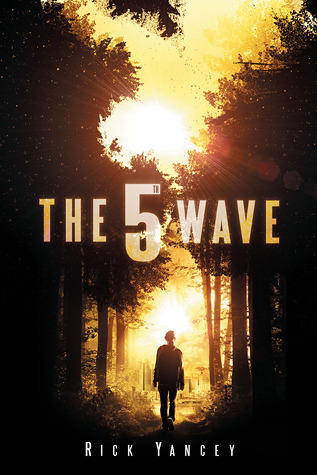 The 5th Wave
The 5th Wave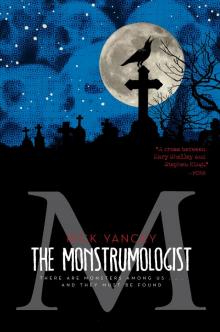 The Monstrumologist
The Monstrumologist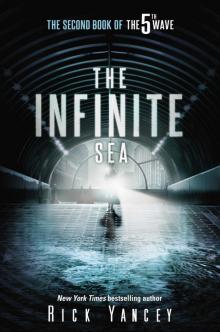 The Infinite Sea
The Infinite Sea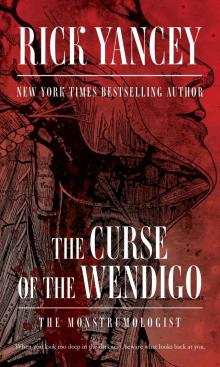 The Curse of the Wendigo
The Curse of the Wendigo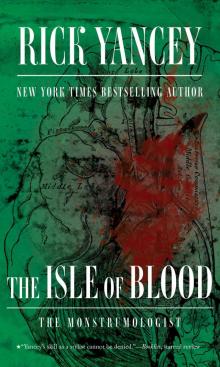 The Isle of Blood
The Isle of Blood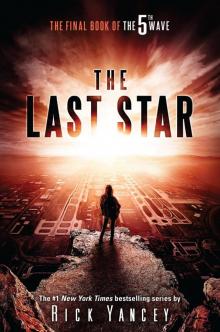 The Last Star
The Last Star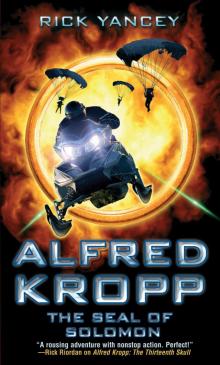 The Seal of Solomon
The Seal of Solomon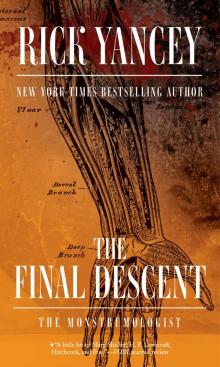 The Final Descent
The Final Descent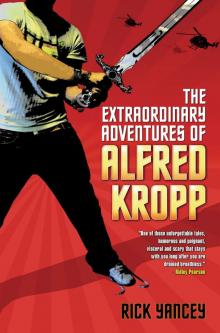 The Extraordinary Adventures of Alfred Kropp
The Extraordinary Adventures of Alfred Kropp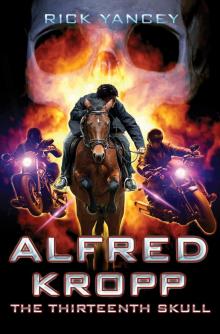 The Thirteenth Skull
The Thirteenth Skull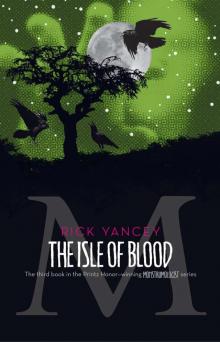 The Isle of Blood (Monstrumologist)
The Isle of Blood (Monstrumologist)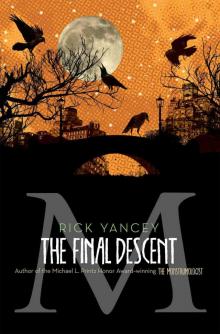 The Final Descent (The Monstrumologist)
The Final Descent (The Monstrumologist)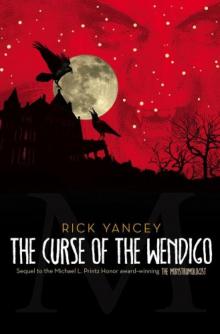 The Curse of the Wendigo (The Monstrumologist, Book 2)
The Curse of the Wendigo (The Monstrumologist, Book 2)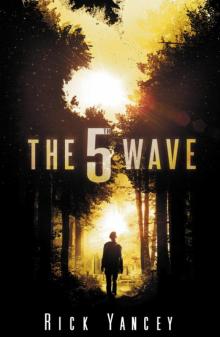 The 5th Wave t5w-1
The 5th Wave t5w-1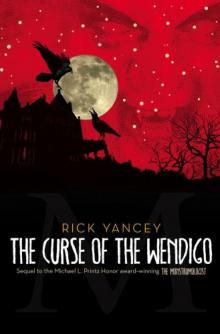 The Curse of the Wendigo (The Monstrumologist, Book 2) m-2
The Curse of the Wendigo (The Monstrumologist, Book 2) m-2